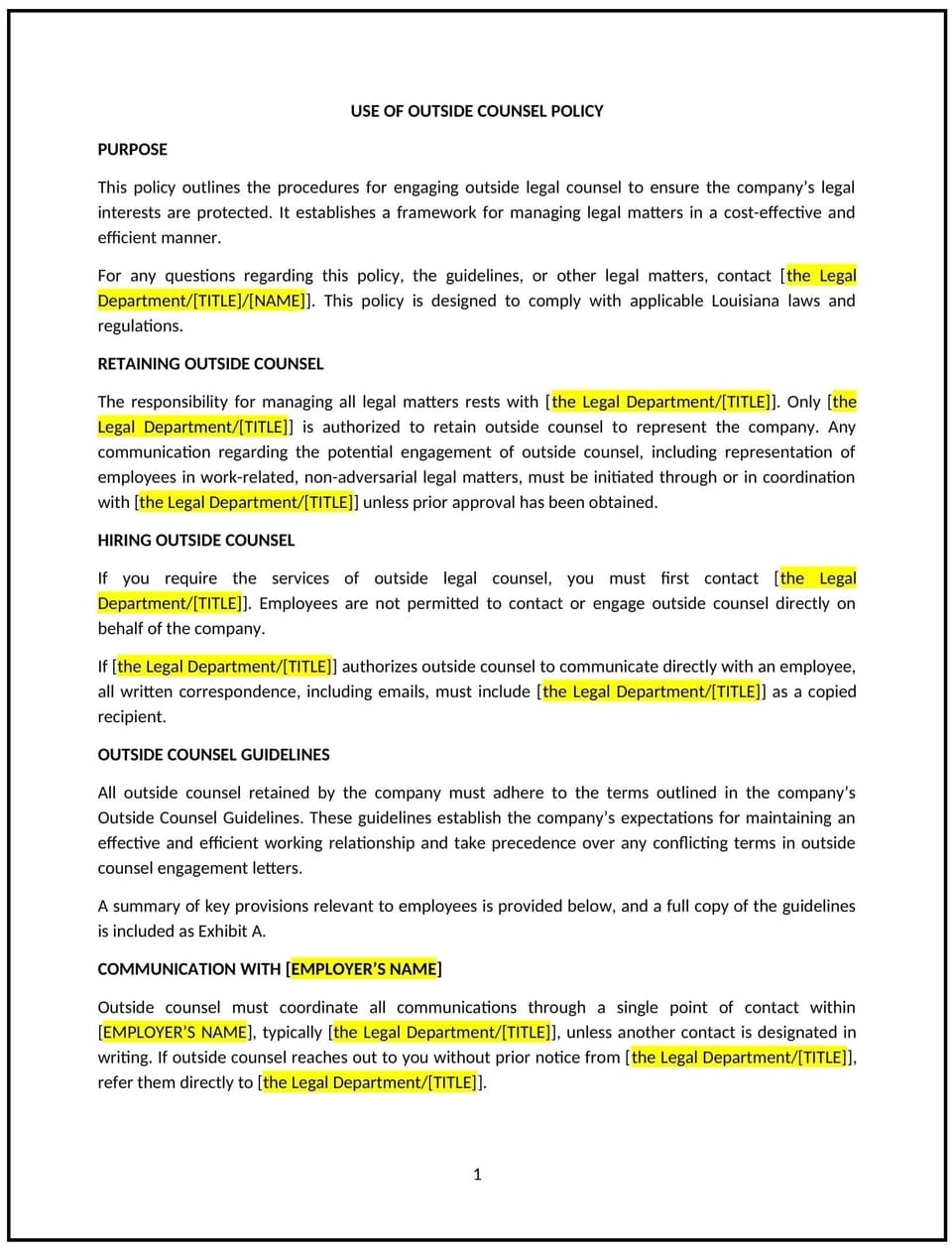Use of outside counsel policy (Louisiana): Free template

Use of outside counsel policy (Louisiana)
This use of outside counsel policy is designed to help Louisiana businesses establish clear guidelines for engaging and managing legal representation from external law firms or attorneys. It outlines procedures for seeking approval, monitoring performance, and managing costs associated with outside counsel.
By implementing this policy, businesses can ensure efficient and effective use of legal resources while maintaining accountability.
How to use this use of outside counsel policy (Louisiana)
- Define scope: Specify the types of legal matters that may require outside counsel, such as litigation, regulatory compliance, or specialized legal advice.
- Outline approval procedures: Detail the steps for seeking approval to engage outside counsel, including justification for their use and cost estimates.
- Include selection criteria: Provide guidelines for selecting outside counsel based on expertise, experience, and cost-effectiveness.
- Address cost management: Clarify expectations for fee structures, billing practices, and cost control measures.
- Monitor performance: Establish procedures for evaluating the effectiveness and value of outside counsel’s services.
- Communicate reporting requirements: Specify how outside counsel should provide updates on case progress or deliverables.
Benefits of using a use of outside counsel policy (Louisiana)
Implementing this policy provides several advantages for Louisiana businesses:
- Controls costs: Manages legal expenses by setting clear guidelines for outside counsel engagement and billing.
- Enhances oversight: Ensures accountability in the use of external legal services.
- Provides expertise: Allows businesses to access specialized legal knowledge when needed.
- Promotes consistency: Establishes a standardized process for engaging and managing outside counsel.
- Reflects Louisiana-specific considerations: Adapts to regional legal practices and business needs.
Tips for using this use of outside counsel policy (Louisiana)
- Train decision-makers: Ensure managers understand when and how to engage outside counsel appropriately.
- Negotiate fees upfront: Establish clear agreements on fee structures, including flat fees, hourly rates, or retainers.
- Track legal expenses: Maintain detailed records of outside counsel costs and evaluate them against budgeted amounts.
- Communicate expectations: Provide clear instructions to outside counsel regarding reporting and deliverables.
- Update regularly: Revise the policy to reflect changes in legal needs, business practices, or Louisiana-specific considerations.
Q: When should outside counsel be engaged under this policy?
A: Outside counsel should be engaged for complex or specialized legal matters, such as litigation, regulatory issues, or transactions requiring specific expertise.
Q: What is the process for obtaining approval to use outside counsel?
A: Employees must submit a written request to management or the legal department, including the nature of the matter and a cost estimate.
Q: How should businesses select outside counsel?
A: Selection should be based on factors such as expertise, experience, cost, and the law firm’s familiarity with Louisiana-specific legal matters.
Q: What are the cost management expectations for outside counsel?
A: Businesses should agree on fee structures upfront, review invoices carefully, and monitor legal expenses against budgets.
Q: How should outside counsel provide updates on their work?
A: Outside counsel should deliver regular progress reports, case updates, or summaries of completed tasks, as agreed upon in advance.
Q: How often should this policy be reviewed?
A: The policy should be reviewed annually or when changes occur in legal needs or Louisiana-specific practices.
Q: Can outside counsel be engaged for routine legal matters?
A: Routine matters are typically handled in-house, but exceptions may be made based on workload or the need for specialized expertise.
This article contains general legal information and does not contain legal advice. Cobrief is not a law firm or a substitute for an attorney or law firm. The law is complex and changes often. For legal advice, please ask a lawyer.


